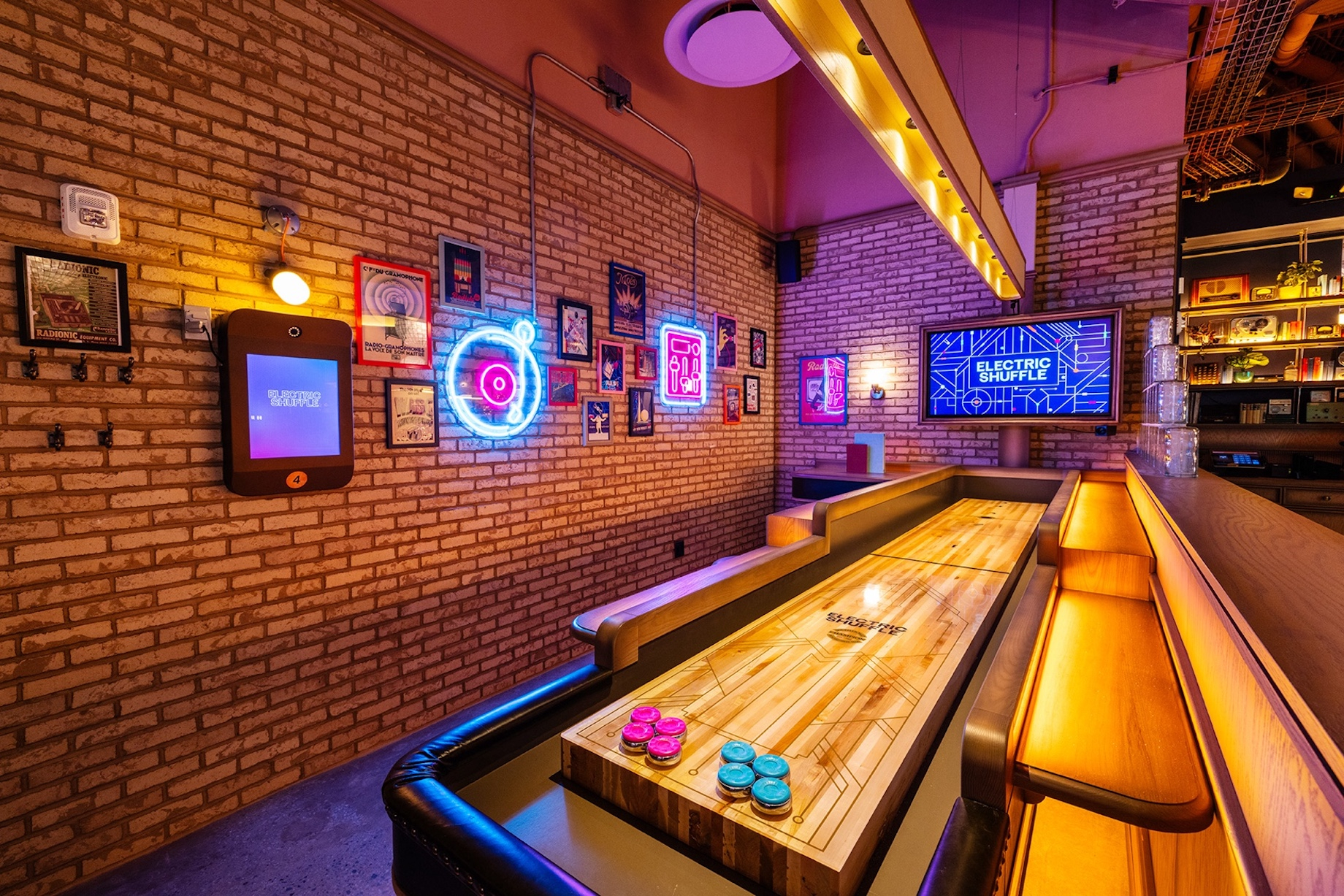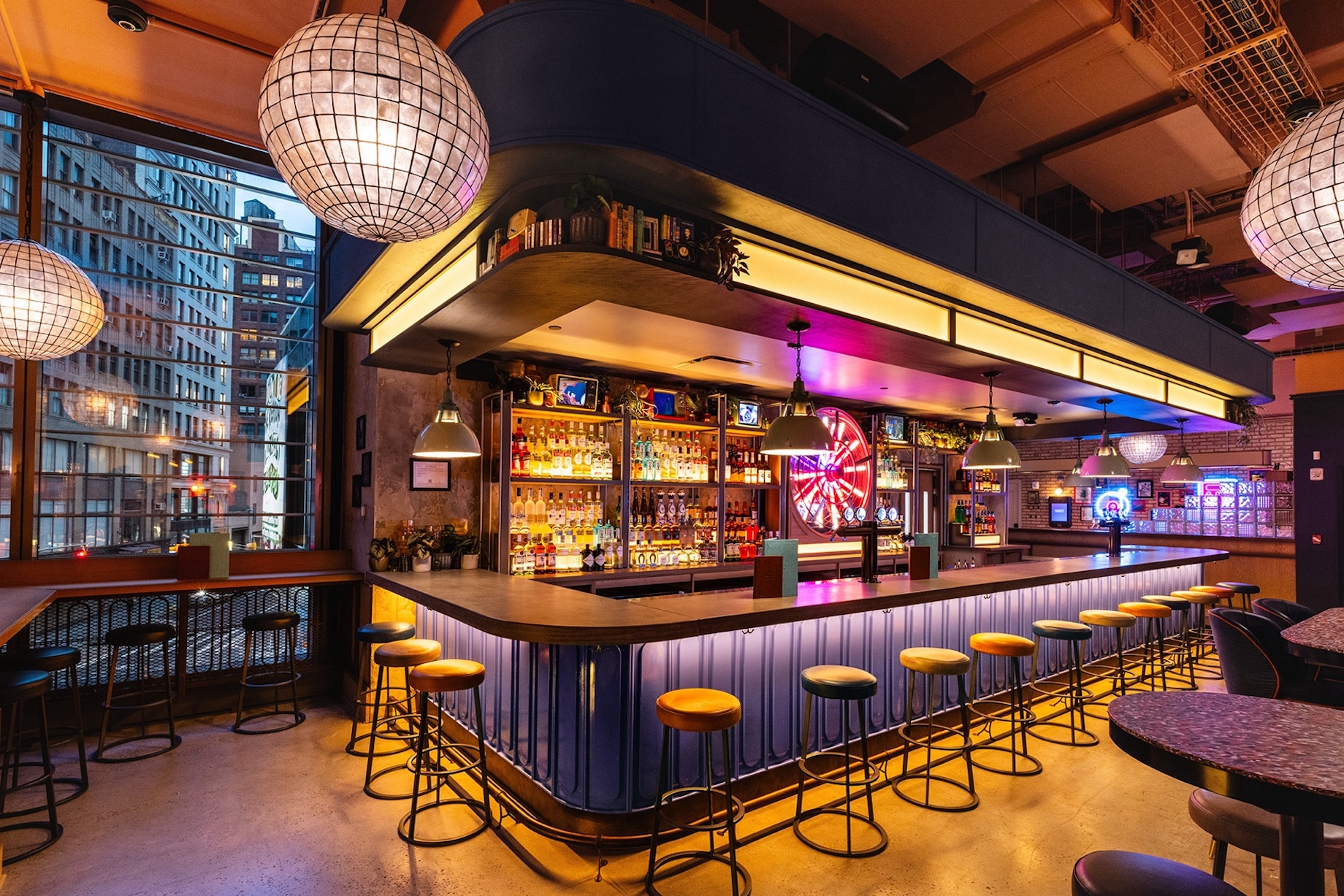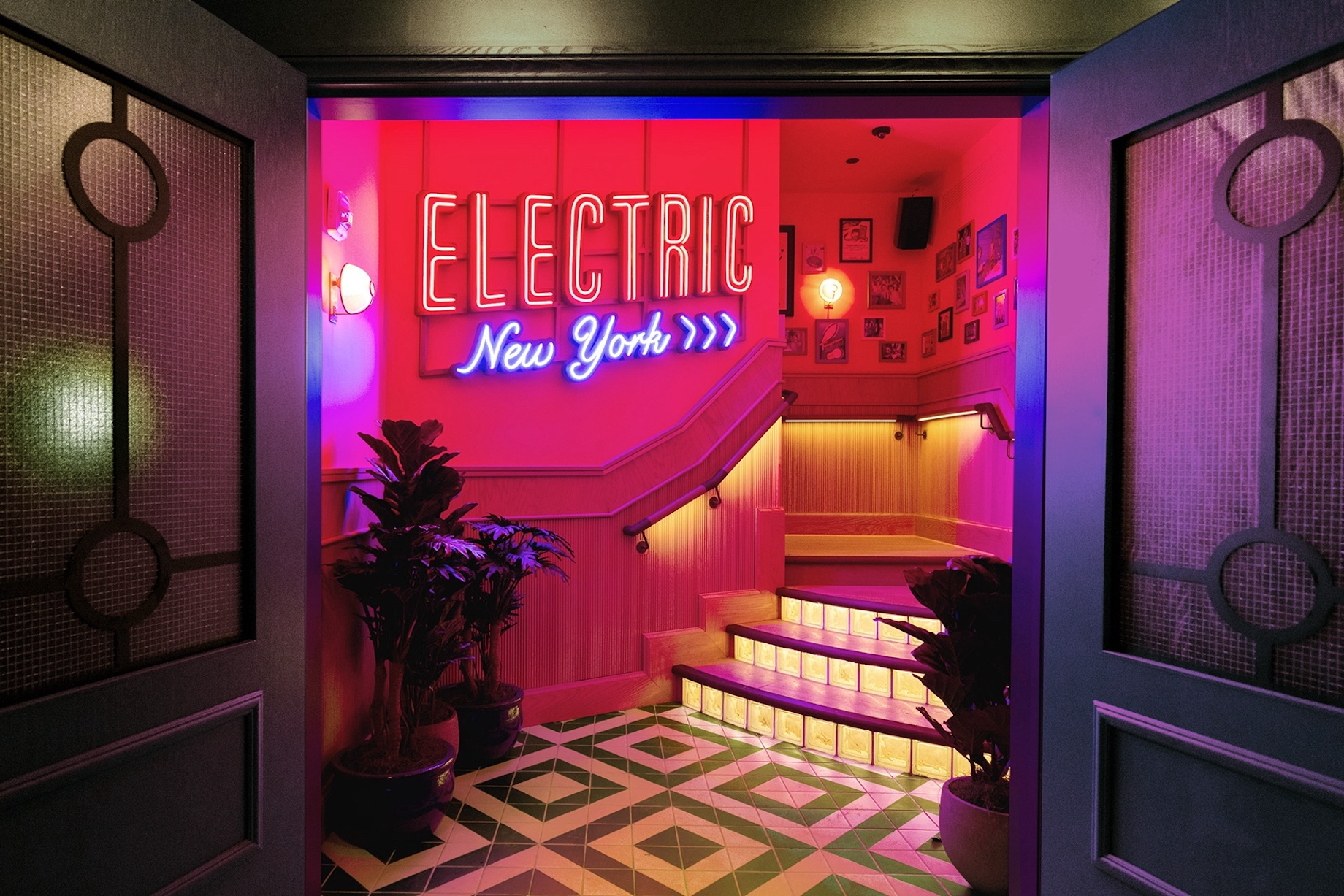More than 10 years ago, Electric Shuffle co-founders and friends Steve Moore and Paul Barham stopped at a bar in Houston and saw a crowd of young people gathered playing table shuffleboard, laughing, talking and drinking. In Moore and Barham’s minds, shuffleboard was something people played at retirement homes or at bars in the ’50s, but here were young people enjoying the game. Moore and Barham loved that it was approachable and that anybody could win.
Forever on the hunt for exciting experiences to share with their friends, the pair who also founded the Flight Club chain of social darts venues, returned home to London and created a concept called Electric Shuffle. Shuffleboard would be the draw, but the vibe, food and atmosphere would play just as big a part. “We wanted to create as much joy and happiness for people and give them something different,” recalled Electric Shuffle USA president Gene Ball. As he recounted, Moore and Barham thought: “How do we bring these classic bar games into a more modern spin that can get more people together, refine them a bit and make them way more approachable using technology, game design and hospitality?”
Their contemporary spin on shuffleboard using high-tech tables that track and score every puck so people wouldn’t have to keep score themselves. “We use the same camera vision technology that NASA and the Air Force use,” said Ball. Live replays spotlight guests’ best moments. “We’re able to process replays in real time, faster than major league sports,” Ball added. The tables can account for as many as 20 players at a time. Between turns, players can snack on steak and roasted tomato skewers, truffle mac and cheese bites and more and sip on cocktails like salted caramel espresso martinis.

Electric Shuffle’s combination of a vintage vibe and modern technology are on display in its Manhattan location.
The concept has been successful. Four Electric Shuffles operate in the U.K. — two in London, one each in Leeds and Manchester — and three run in the U.S. — in Dallas, Austin and New York. A Chicago location will open this winter.
The New Appeal of Both Tabletop and Deck Shuffleboard
Traditional deck shuffleboard also been in the spotlight in recent years. You could say Royal Palms Shuffleboard Club ushered in the sport’s new era with the 2014 opening of its 17,000-square-foot location in Brooklyn. The warehouse renovation features 10 lanes. The concept’s second location opened in Chicago in 2018. Larks Entertainment, meanwhile, operates shuffleboard-themed restaurants in Cleveland; Fairview, Texas; and Kansas City, Missouri, and has locations coming in Nashville, Tennessee; San Antonio; San Diego; St. Petersburg, Florida; Boston; Atlanta; and Birmingham, Alabama. Other shuffleboard venues also run in Cleveland, Atlanta and Virginia Beach, Virginia, among others.
“It’s been a slow burn,” James Cook, JLL senior director of research for Americas retail, said of shuffleboard’s growth in the US. But its popularity is accelerating in part because Gen Zers are looking for something different to do when they go out. “It’s part of this competitive socializing trend,” he said. “At the end of the day, people want a reason to get together with their friends. My generation just drank, but a lot of people are getting away from alcohol and are like: ‘What can we do?’ If you have a game that people can play together, that’s a great central focus.”
Additionally, “there’s this trend of taking old things that had once fallen out of favor and making them new again,” said Cook. Think duckpin bowling, pinball, pool, and axe throwing. “These concepts that are kind of unique, familiar but different, have a chance to grow.”
Plus, such activities look really good in social media videos and photos. “Any type of experiential gaming concept can take off so long that it has an Instagrammable feature to it,” said Colliers Retail Services national research manager Nicole Larson, “something that makes people say, when, they walk in: ‘Oh wow, I should be taking so many photos here.’”
Additionally, shuffleboard, she said, is something a lot of people haven’t tried yet, unlike, say, axe throwing. “It’s new and different,” Larson said. “People are bored with bowling.” Clevelander Erin Dreyfuss found that novelty exciting. “It was a different activity from just going out to dinner,” she said, and it “was better on my manicure” than bowling.
One doesn’t have to be an expert to play shuffleboard, either. That appealed to the 41-year-old Dreyfuss after she played at Forest City Shuffleboard, a 7,500 square-foot facility in Cleveland with two tabletop shuffleboard courts, five indoor ground courts and two outdoor courts. “We first went there to do something fun and different to celebrate my father-in-law’s birthday,” she said. “We had such a good time, we went back for my birthday a few years later with friends and had just as much fun.” It was easy enough that “you could hold your beer and play at the same time,” she said.
The Appeal to Landlords
It's tempting to compare shuffleboard and pickleball, but it wouldn’t be fair to call shuffleboard the next pickleball, said Cook. Pickleball — the fastest-growing sport in the U.S. for three years, according to the Sports & Fitness Industry Association’s Topline Participation Report — is about “people doing regular exercise,” he said. Shuffleboard is “really about the fun aspect.”
Nonetheless, shuffleboard, like many competitive socializing and experiential concepts, is a draw for landlords. Experiential tenants have become a significant tenant category. In a Colliers report this year, Larson wrote: “Demand in junior and anchor spaces spans various sectors, including discount and health and beauty, with the experiential sector — led by tenants like Planet Fitness and Urban Air — growing to represent about 15% of leasing activity, a notable increase from previous years.”
These sorts of concepts can drive traffic both on weekends and weekdays, Cook said. Many of the deck shuffleboard concepts, for instance, offer weekday league play. Electric Shuffle offers happy hour specials on weekdays, as well as birthday parties and corporate events. And the food and cocktail menu mean people come there not just to play. “My favorite thing is when you come in and the bar is just filled with people hanging out,” said Ball.

Food-and-beverage broaden the appeal of Electric Shuffle’s gameplay.
Deck shuffleboard locations, like bowling alleys and pickleball locations, require thousands of square feet, though less buildout. Table shuffleboard concepts are more flexible. “We’ve got locations from 6,000 square feet all the way up to 12,000 square feet,” said Ball. He added: “We’ve done everything from renovating a 100-year-old building in Dallas to going into brand-new buildings like in New York and Chicago.” Electric Shuffle is working with SRS Real Estate Partners to look for U.S. locations with corporate and population density in major metropolitan areas. “Whether it’s a mixed-use office building or a mixed-use residential building, we bring something really cool to residents, colleagues and workers,” Ball said.
Shuffleboard may not yet be mainstream, but Ball is excited to watch its growth. “We think the more people play, the more people will understand and love it.”

By Rebecca Meiser
Contributor, Commerce + Communities Today and Small Business Center